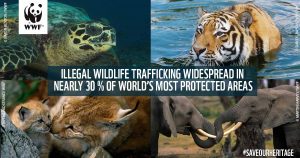As per a report titled `Not For Sale`, published by the World Wide Fund for Nature (WWF), nearly 30% of World Heritage Sites are plagued by poaching, illegal logging and fishing. Owing to these activities, endangered species within these sites have been pushed to the brink of extinction and the livelihood of local people has been threatened.
Important Highlights of the Report:
The report has drawn attention to the disturbing trend in illegal trafficking for international trade of CITES-listed species procured from ecologically sensitive places including natural World Heritage Sites in India.
- Species such as Snow Leopards, Elephants, Rhinos and Jaguars are on the hit list of poachers. These species are mainly found in various World Heritage Sites across the world.
- The report has listed seven sites in India where illegal activities are carried out and have been targeted towards rarest of rare species like snow leopards and pangolins. These seven sites are: Great Himalayan National Park, Nanda Devi National Park, Keoladeo
 National Park, Manas Wildlife Sanctuary, Kaziranga National Park, Western Ghats and the recently added Khangchendzonga National Park.
National Park, Manas Wildlife Sanctuary, Kaziranga National Park, Western Ghats and the recently added Khangchendzonga National Park. - The report pointed out that illegal harvesting of wildlife species at World Heritage Sites was the key factor responsible for 60% drop in global wildlife population from 1970 to 2012.
- Moreover, these activities also tamper the natural ecosystem and create imbalances which may have serious consequences.
- Almost 90% of the World Heritage Sites are tourism destinations. If the wildlife species within these sites which are the key attraction become extinct, it will result in loss of jobs in tourism industry.
- The report has urged CITES, the World Heritage Convention and national authorities to form a united front and take strict actions to curb wildlife trafficking.
About CITES:
Abbreviation CITES stands for Convention on International Trade in Endangered Species of Wild Fauna and Flora. It is an international agreement between governments to ensure that international trade in specimens of wild animals and plants does not threaten their survival. It is in force since July 1, 1975. Over 5,000 animals and 30,000 plants are currently listed under CITES.
Quick Facts about World Wide Fund for Nature – WWF:
- Foundation Year: 1961
- Headquarters: Gland, Switzerland
- Purpose: Environment and Wildlife Conservation
- Organisation Type: International Non-Governmental, Non-Profit Organisation
- Director General: Marco Lambertini


 National Park, Manas Wildlife Sanctuary, Kaziranga National Park, Western Ghats and the recently added Khangchendzonga National Park.
National Park, Manas Wildlife Sanctuary, Kaziranga National Park, Western Ghats and the recently added Khangchendzonga National Park.